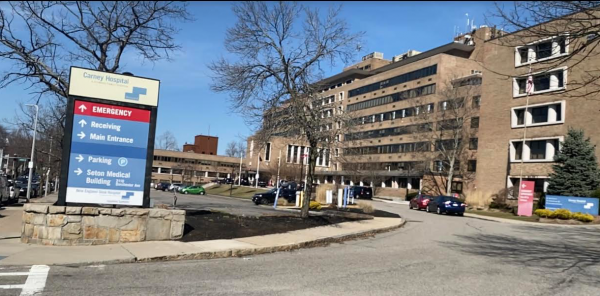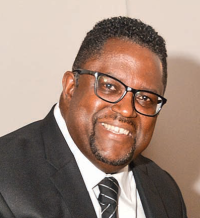March 8, 2023

Carney Hospital on Dorchester Avenue. Reporter file photo

Carney Hospital, Dorchester’s primary health care facility and one of the neighborhood’s largest employers, is once again facing tough questions about its long-term viability as its leadership juggles rising costs, an unresolved labor contract, and a dysfunctional insurance reimbursement system that has long put community hospitals like Carney at an unfair competitive disadvantage.
This week, the hospital’s president acknowledged the multi-layered financial challenges facing the 159-bed facility and emergency department but emphasized that he and Steward Health Care Network, the parent company that owns the Carney, remain committed to its future on the Dorchester Avenue campus.
“There are no imminent plans to close Carney,” said Stan McLaren in an interview on Tuesday. “We’ve been serving the Boston community for 150 years and our plans are to be around for another 150 years. I think we’re a gem in the Lower Mills area.”
But McLaren, who took over as president in May 2021 after several years as the leader at Harvard Street Neighborhood Health Center, admits that the road forward is pock-marked with existential challenges.
“We don’t have any current plans to close, but I don’t want to paint too rosy a picture. Carney has struggled financially for years, and the pandemic has exacerbated things. And it’s not just Carney. Some places when they catch a cold, we catch a fever. We don’t have this huge private [insurance] base to support us.”
Nurses at Carney, who are currently engaged in a months-long collective bargaining process with Steward to renew their contract, are sympathetic to McLaren’s argument about Carney’s place in the Boston market. But they also are raising alarms about Steward’s approach to operating the Carney over the last two years, citing a lack of resources, staffing, and supply shortages that they worry are indicators of the kind of disinvestment that often precedes closures at similarly situated community hospitals.
Elaine Graves, RN, who has worked at the Carney for 47 years, is one of the veteran nurses who are speaking out.
“I can honestly say I’ve never seen it this bad,” said Graves, who works on a post-surgical recovery unit. She notes that the operating room no longer books any procedures on Fridays, which she and other nurses take as a foreboding sign, since operations are one of the few reliable profit centers at Carney.
“It’s not because of a lack of personnel, but it’s a lack of anasthesia,” she said, using RN shorthand to refer to the lack of anesthesiologists to staff the floor. “It’s like they’re setting us up.”
Like other nurses at Carney – members of the Massachusetts Nurses Association – Graves is worried that Carney is deliberately being starved of resources by Steward.
Another troubling sign, according to the union: They say that Steward has only offered Carney’s nurses a one-year contract, while other hospitals in the Steward system have longer-duration offers on the table.
Nurses at St. Elizabeth Hospital, considered the flagship Steward hospital in the region, recently agreed to a multi-year contract. The Carney’s nurses contract expired at the end of December and they are now working on a mutually-agreed-to month-to-month extensions with Steward as negotiations continue.
For his part, McLaren says negotiations are very positive and he is optimistic that an agreement will be reached soon, though he did dispute the nurses’ characterization of Steward’s posture regarding the hospital’s future.
In addition to internal anxieties voiced by nurses and other staff, Carney’s capacity to engage with the Dorchester community has been diminished significantly in the last year. Mid-level management positions in communications and public affairs at the hospital have been eliminated, leaving Carney with little to no means of relaying information to the public.
A review of its social media channels show that they have been used exclusively to recruit people for unfilled jobs in recent months, with no information at all about programs, emergency wait times, or quality performance that were once relayed to their client base in a routine and consistent manner.
That information void is one reason that drove Lower Mills Civic Association president Michael Skillin to invite McLaren to speak at a Feb. 21 meeting of the civic group. McLaren cancelled at the last minute due to a possible exposure to Covid, according to Skillin. No other hospital official was sent in his stead to speak to neighbors, many of whom have grown worried about the hospital’s future. Skillin noted that McLaren has now been invited to come to the group’s March meeting.
About a dozen Carney nurses did attend the civic session and voiced their own concerns about the hospital’s health and future.
One of those who spoke, Karen Skarbek, RN, said the nurses were there to “support Stan,” whom many view sympathetically as a Dorchester resident who is passionate about the mission of Carney. But Skarbek and others say they are not confident that the parent corporation is as committed.
McLaren disputed that narrative in speaking to the Reporter. He said Carney remains “the choice of care for many of the people here in Dorchester and Mattapan. We’re still averaging 30,000 visits to the ED every year. We have about 15,000 or more OR visits and thousands more accessing services. We have some of the best doctors in Boston and we employ 850 community members and they provide quality care.”
One sign that Steward intends to keep Carney open, but perhaps with different care options, is the system’s decision to relocate a 25-bed Substance Use Disorder (SUD) unit currently housed at Morton Hospital in Taunton to Carney in the coming weeks.
McLaren said that staff and support services from Morton would move to Carney and “will establish a relationship similar to the one we have with the St. Elizabeth’s Geriatric Psych Unit that is on the 4th floor.”
He told the Reporter this week that the new detox unit “does not take away any existing capacity. We have a huge building here with a huge infrastructure.” But, he added, there will be costs associated with converting space into a detox unit.
As to reimbursements, McLaren said, “We’re not getting paid enough,” noting that downtown hospitals and other facilities receive a higher rate of payment from both public and private insurers than Carney gets for the same services and procedures.
“We’re just trying to get to break even,” he said.
Insurance executives, local lawmakers and newly seated policymakers in Gov. Healey’s administration should expect to hear from Steward’s latest hire – Dr. Marisela Marrero, Senior Vice-President for Health Care Equity – in the coming weeks. Dr. Marrero says it’s now her job to convince policy makers and insurance executives that Carney should get higher, more equitable reimbursements for procedures.
The Carney, she says, is the lowest paid for the same procedures in the city – 10 percent less on average, she claims.
“When you don’t invest into communities like Dorchester, you’re putting hospitals at risk for financial viability,” said Marrero. “We need places like Carney to survive. But we need the insurance side to put up what we need, and that’s both government payers and private insurers.”
There’s one thing that Steward brass and union organizers agree on: The system for paying for care at Carney and other community hospitals is broken and deeply unfair, especially to communities of color.
Dana Simon, the MNA’s director of strategic campaigns, does not dispute Steward's characterization of the reimbursement disparity. He noted that “community hospitals in working class neighborhoods like the Carney are badly underfunded and reimbursements at Carney are far less than for downtown hospitals and those in wealthy suburbs.”
“The overwhelming majority of patients there and, for example, at Lawrence General Hospital, are insured by Medicare and Medicaid, which reimburse less than the cost of care,” he said. “For the minority of patients with private insurance at those hospitals, the very same insurance companies pay Carney and Lawrence General less for the same services than they pay hospitals in wealthy neighborhoods.
“It is systematically discriminatory against working class and people of color who are served by hospitals in their neighborhoods,” he said.



